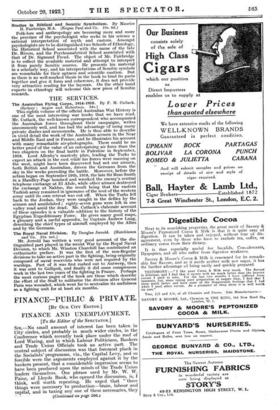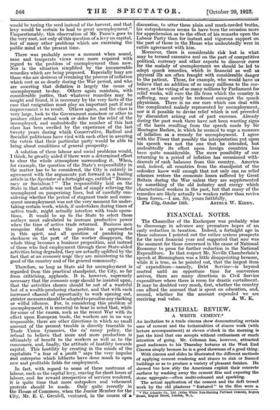FINANCE—PUBLIC & PRIVATE.
[BY OUR CITY EDITOR.]
FINANCE AND UNEMPLOYMENT.
[To the Editor of the SPECTATOR.]
SIR,—No small amount of interest has been taken in City circles, and probably in much wider circles, in the Conference which recently took place under the roof of Lord Waring, and in which Labour Politicians, Bankers and Trade Union Officials took an active part. The central subject of discussion was that foremost plank in the Socialists' programme, viz., the Capital Levy, and so forcible were the arguments employed against it by the bankers present, that a considerable impression seems to have been produced upon the minds of the Trade Union leaders themselves. One phrase used by Mr. W. W. Paine, of Lloyds Bank, who opened the discussion, is, I think, well worth repeating. He urged that " three things were necessary to production—brain, labour and capital, and in taxing any one of these necessaries, they
(Continued on page 506.) would be taxing the seed instead of the harvest, and that levy would be certain to lead to great unemployment." Unquestionably, this observation of Mr. Paine's goes to the very root, not only of this question of a levy on capital, but of many other problems which are exercising the public mind at the present time.
There was probably never a moment when sound, sane and temperate views were more required with regard to the problem of unemployment than now. Nor is the situation simplified, by the innumerable remedies which are being proposed. Especially busy are those who are desirous of resuming the process of inflation which cost us so dearly during the War period, and who are asserting that deflation is largely the cause of unemployment to-day. Others again maintain, with considerable justice, that whatever remedies may be sought and found, it is necessary by the very facts of the case that emigration must play an important part if real improvement is to result. Others- again, and the class is very large, look to the Government somehow or other to produce either actual work or doles for the relief of the unemployed, and undoubtedly the number of this last class has been swelled by the experience of the last twenty years during which Conservative, Radical and Socialist politicians have vied with each other in assuring the voters that their particular party would be able to bring about conditions of general prosperity.
A solution of these labour and social problems would, I think, be greatly aided if there were a determined effort to clear the whole atmosphere surrounding it When, for example, the question of the State's responsibility in the matter has to be considered; the City is entirely in agreement with the arguments put forward in a leading article in the Spectator of a fortnight ago, entitled " Democ- racy or Socialism ? " The responsibility laid on the State in that article was not that of simply relieving the unemployed on pauperizing lines, but of carefully con- sidering whether the period of stagnant trade and conse- quent unemployment was not the very moment for under- taking certain work, which, if undertaken during times of active trade, might actually interfere with trade opera- tions. It would be up to the State to select those outlays most calculated to increase productive power when the time of active trade returned. Business men recognize that when the problem is approached in this spirit, and all question of pandering to slackness on the part of the worker disappears, the whole thing becomes a business proposition, and instead of those who find employment through these State-aided activities being degraded, they are actually uplifted by the fact that at an economic wage they are ministering to the good of the country and of the general community.
Therefore, so long as State aid for unemployment is regarded from this practical standpoint, the City, so far from criticising, applauds. It is, however, supremely necessary that the economic wage should be insisted upon, that the activities chosen should be not of a wasteful but of a wealth-producing character, and that with each increased channel of opportunity to work opening out, stricter measures should be adopted to penalize any-slacking or wilful idleness. For, in considering this problem of unemployment, it is essential to bear in -mind that, while for some of the causes, such as the recent War with its effect upon European trade, the workers are in no way responsible, there are other directions in which no small amount of the present trouble is directly traceable to Trade Union tyrannies, the ca' canny policy, the refusal to believe that more and more production is ultimately of benefit to the workers as well as to the consumers, and, finally, the attitude of hostility towards capital. This hostility by creating in the minds of the capitalists " a fear of a profit " saps the very impulse and enterprise which hitherto have done much to open new and profitable fields for employment.
In fact, with regard to some of these nostrums of labour, such as the capital levy, craving for short hours of labour, and for reward irrespective of services rendered, it is quite time that more outspoken and vehement protests should be made. Only quite recently in the House of Commons, when the Junior Member for the City, Mr. E. C. Grenfell, ventured, in the course of a discussion, to utter these plain and much-needed truths, his outspokenness seems to have been the occasion more for apprehension as to the effect of his remarks upon the Labour Party than for instant and vigorous support on the part of those in the House who undoubtedly were in entire agreement with him.
Moreover, there is considerable risk lest in what may be termed excessive zeal on the part of competitive political, currency and other experts to discover cures for the malady of unemployment we should be led to adopt quack remedies, which- in financial as well as physical ills are often fraught with- considerable danger to the patient. Those, for example, who would have us believe that an addition of so many millions to the cur- rency, or the voting of so many millions by Parliament for relief works, will cure the ills from which the country is suffering, may surely be reckoned amongst the quack physicians. There is no one cure which can deal with the complicated malady represented by unemployment, nor is it possible to devise relief which is not preceded by discomfort arising out of past excesses. Already during the past week there have not been wanting signs of the harm resulting from the speech made by Sir Montague Barlow, in which he seemed to urge a measure of inflation as a remedy for unemployment. I agree with the Times that possibly the interpretation put upon his speech was not the one that he intended, but undoubtedly its effect upon foreign countries has been quite considerable. The mere possibility of our returning to a period of inflation has occasioned with- drawals of cash balances from this country. America and, indeed, all countries from the standpoint of the onlooker know well enough that not only can no relief schemes restore the economic losses suffered by Great Britain during the War unless they are supplemented by something of the old industry and energy which characterized workers in the past, but that many of the remedies are likely actually to weaken rather than revive those forces.—I am, Sir, yours faithfully,











































 Previous page
Previous page